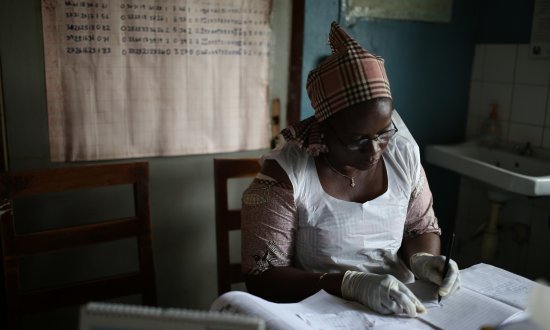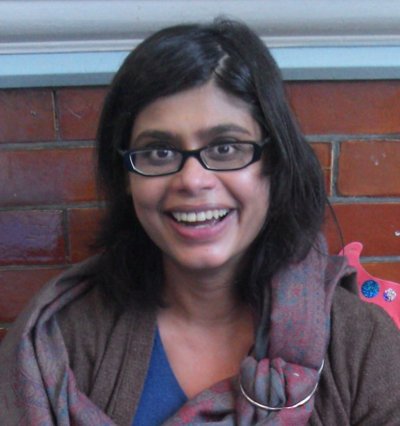
Dr Charvy Narain holds a doctorate in Neurosciences from the University of Oxford, and has worked in research communications for over 15 years. In her currently role as Communications Manager for IDDO, she provides strategic communications advice and implements IDDO's communications strategy across various communications channels, including the IDDO website and social media. She also line manages the IDDO communications officer.
IDDO’s team looks forward to sharing its latest research at ASTMH
Join IDDO and WWARN’s researchers at this year’s ASTMH - the 72nd annual meeting in Chicago, USA, where we will be presenting on Visceral Leishmaniasis, malaria, and medicine quality across symposia, oral presentations and posters.
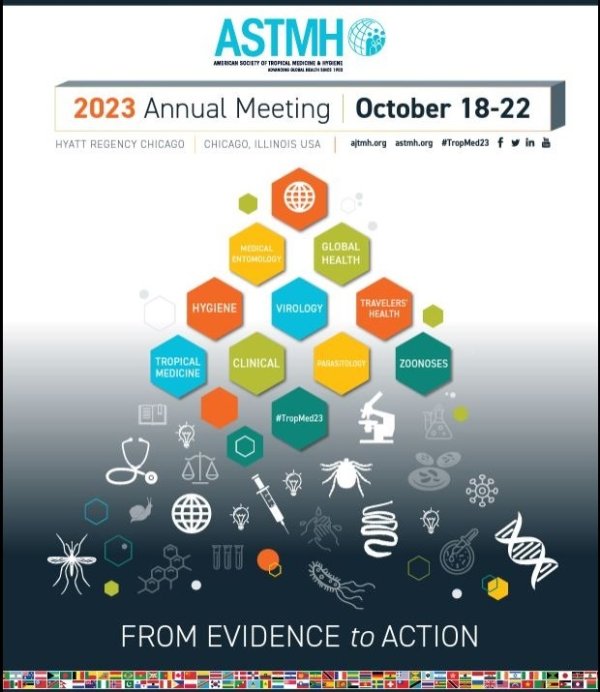
This year IDDO will be at stand #305, as part of Oxford Tropical Medicine, University of Oxford. Come and see us to find out about more about our research, data platforms and latest work.
Symposia - October 20
IDDO’s team is hosting a symposium titled: ‘From a single dataset to a million patients: Solutions to pool and harmonise IPD for effective and equitable reuse of data to generate new evidence in an open science framework’. Taking place on Friday, 20 Oct 4.00pm to 5.45pm (CST) the symposium will be chaired by Professor Philippe Guerin and Dr Manju Rahi, with presentations by:
Kalynn Kennon: Solutions to open science and data reuse;
- Dr Rob Terry: Governance of data reuse
- Dr Rob Commons: The impact of data reuse in malaria
- Maria Jesus Pinazo: The impact of data reuse in NTDs
- Professor Phaik Yeong Cheah: Applications and next steps in new environments
Symposia - October 22
IDDO’s Medicine Quality Research Group will host a symposium titled 'Countering the Wicked Problem of Bad Quality Medicines'. It has been organised by Professor Marya Lieberman, of U. Notre Dame, USA, and Professor Paul Newton and takes place on Sunday, October 22, at 8am (CST)
The presentation topics are systems/supply chains, pharmaceuticals and medical products and include:
Systems/Supply chains:
- Ashley Lee presenting on behalf of Professor Sachiko Ozawa, of the University of North Carolina Eshelman School of Pharmacy (UNC): Modelling the economic and clinical impact of substandard and falsified drugs
- Dr Céline Caillet, University of Oxford-MORU Tropical Health Network/Infectious Diseases Data Observatory: An app (Epione) for facilitating medicine quality surveys
Pharmaceuticals:
- Dr Noudy Sengxeu (University of Health Sciences, Vientiane, Lao PDR): ABACUS2-MQ Survey of the quality of antibiotics in four countries
- Dr Ayenew Ashenef (pre-recorded talk), Addis Ababa University--Department of Pharmaceutical Chemistry and Pharmacognosy: Quality of chemotherapy drugs in Ethiopia
Medical products:
- Dr Céline Caillet, presenting on behalf of Professor Paul Newton, University of Oxford-MORU Tropical Health Network/Infectious Diseases Data Observatory: Evaluation of devices for detecting substandard and falsified vaccines in supply chains
This symposium will also include a Poster Session and ‘petting zoo’ for medicine screening devices.
There will be an informal meeting of those interested in medicine quality research, policy and implementation from 11am to 2.30pm, on Saturday, October 21, in the San Francisco Room - Ballroom Level (West Tower), Hyatt Regency Chicago. Please let Paul Newton know if you would like to attend.
Dr Robert Commons, of Menzies School of Health Research, Darwin, Australia, and WWARN Postdoctoral Researcher (ARC-A), will chair a symposium titled: ‘Emerging data on how best to use primaquine and tafenoquine for the radical cure of P. vivax’ on Sunday, October 22, from 8am to 9.45am (CDT).
The speakers include:
- Megha Rajasekhar, The University of Melbourne: Trade-off between short term hemolytic risk and long-term benefit of 8-aminoquinoline treatment
- Dr Ihsan Fadilah, Oxford University Clinical Research Unit Indonesia: Is there a way to individualize P. vivax radical cure regimens? Methemoglobin as a marker of antirelapse efficacy
- Brice Campo, Medicines for Malaria Venture: How in vitro and in vivo vivax malaria models can help us understand the outcome of past clinical studies with tafenoquine and design the next set of studies
- Marcus Vinícius Guimarães de Lacerda, Doctor Heitor Vieira Dourado Tropical Medicine Foundation, Brazil: The Tafenoquine Roll-out STudy (TRuST): Real-world evidence on feasibility of providing appropriate P. vivax radical cure with tafenoquine or primaquine after G6PD testing in the Brazilian Amazon – final results from a study of over 6000 patients
Visitors can join Professor Joel Tarning’s oral presentation: Pharmacometric assessment and dose-optimisation of primaquine in the radical cure of Plasmodium vivax malaria in children: an individual patient data meta-analysis on Thursday, October 19, from 3pm to 4.45pm at Scientific Session 34: Malaria: Drug Development and Clinical Trials.
IDDO and WWARN’s researchers are also presenting a number of posters at ASTMH, these are:
Poster Session A: Thursday, October 19, Noon – 1:45 pm United States Central Time Zone
- Dr Rob Commons: Safety and efficacy of primaquine in patients with P. vivax malaria from South Asia: A systematic review and individual patient data meta-analysis #5386
Poster Session B, Friday, October 20, Noon – 1:45 pm United States Central Time Zone
- Dr Prabin Dahal: Host, parasite and drug determinants of treatment outcomes in Visceral Leishmaniasis: An individual patient data meta-analysis using the Infectious Diseases Data Observatory data platform #6351
- Dr Sauman Singh: Ophthalmological Complications in Visceral Leishmaniasis and Post Kala-Azar Dermal Leishmaniasis #6350
Poster Session C, Saturday, October 21, 11 am – 12:45 pm United States Central Time Zone
- Dr Prabin Dahal: Haemoglobin dynamics following treatment of Visceral Leishmaniasis: An individual patient data meta-analysis using the Infectious Diseases Data Observatory data platform #7064
- Professor Joel Tarning, Head of WWARN Pharmacometric Modelling and Co-Head IDDO Asia Pacific Centre - Thailand (ARC - T) - Artemether-lumefantrine as a chemoprophylactic treatment of malaria #6918
- Dr Martin Walker: The lymphatic filariasis treatment study landscape: a systematic review of study characteristics and the case for an individual participant data platform #7039
ASTMH takes place from October 18 to 22, Hyatt Regency Chicago, and more than 4,000 researchers, scientists, physicians and global health experts are expected to attend. For more information view https://www.astmh.org/
If you are not able to join us in-person then why not follow what is happening at the conference over Twitter by following us on @IDDOnews
Read our latest news or email info@iddo.org with your questions.
CDISC compliant case report forms for uncomplicated VL and VL-HIV co-infection: A unique collaborative effort by VL experts and a first in NTDs
A global collaboration of the visceral leishmaniasis (VL) community has developed freely available, annotated case report forms (CRF) to accelerate research both into uncomplicated VL and specifically for patients with HIV-VL co-infection. The CRFs allow the collection of research-related data in a standard format, enabling the research community to capture data that is accessible, interoperable and re-useable for future analysis and collaboration. This harmonised approach to data collection will maximise the value of data for more efficient and meaningful research that has an invaluable impact on global health.
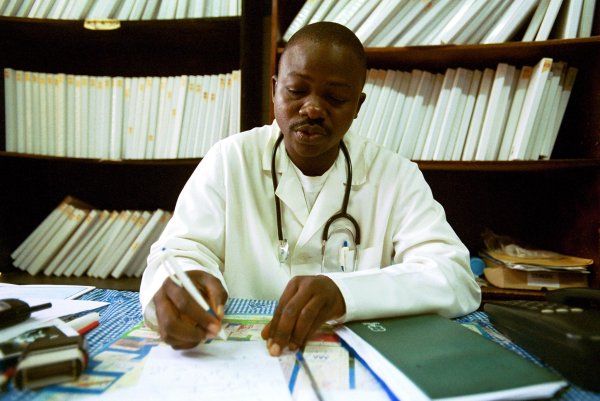
In 2020, scientists and researchers from the VL research community, pharmaceutical industry, drug regulators, policy makers, and key national and global health partners developed the first poverty-related infectious disease CRF to have been annotated using Clinical Data Interchange Standards Consortium (CDISC) standards. During its development, it became clear that with the falling number of leishmaniasis cases, the proportion of patients with HIV co-infection were increasingly important to the control and elimination of the disease. However, these patients do not fit the standard criteria normally required within a clinical trial making conducting studies extremely challenging. Capitalising on the earlier uncomplicated VL CRF work, a specific CRF for HIV-VL co-infection has now been developed with user guides available for both.
Previously, there was no recognised standard approach to guide methods of recording, storing and reporting the VL clinical trial data required for research, and subsequent drug development. This made comparing studies and data relating to the efficacy of treatments from different groups of researchers challenging. However, the new CRFs provide researchers with a standardised means of recording any data they choose to collect according to a study protocol, allowing study endpoints to be comparable and permitting data from disparate sources to be harmonised and pooled for secondary use. The CRFs also utilise CDISC-compliant terminology. CDISC standards are required by the United States Food and Drug Administration (FDA) and Japan Pharmaceuticals and Medical Devices Agency (PMDA); recommended by the China National Medical Products Administration (NMPA); and adopted by the world’s leading research organisations.
Institutions involved in the collaborations, spearheaded by the Infectious Diseases Data Observatory (IDDO) and the Drugs for Neglected Diseases Initiative (DNDi), with support from CDISC, included the International Centre for Diarrhoeal Disease Research (icddr,b,) Bangladesh; University of Brasilia, Brazil; University of Gondar, Ethiopia; Kala-Azar Medical Research Centre (KAMRC), Rajendra Memorial Research Institute of Medical Sciences (RMRI), the Indian Council for Medical Research (ICMR), Institute of Postgraduate Medical Education & Research (IPGMER) and PATH, India; Médecins Sans Frontières (MSF); University of Khartoum, Sudan; as well as researchers from GlaxoSmithKline (GSK) and Novartis; representatives of the regulatory medicines agencies from the European Medicines Agency (EMA) and U.S. Food and Drug Administration (FDA); and national and global health organisations including the Bill & Melinda Gates Foundation and the World Health Organization (WHO).
The case report form for uncomplicated VL CRF was used for the first time in a clinical trial conducted by DNDi in 2021.
Find out more and download the CRFs
About Visceral Leishmaniasis
VL, also known as kala-azar, is transmitted to humans through bites from infected female phlebotomine sand flies. If left untreated, it is fatal in 95% of cases. Globally, it is estimated that there are up to 22,000 new cases of VL each year which occur in Brazil, Ethiopia, India, Kenya, Somalia, South Sudan and Sudan.
About the global collaboration
The group initially met in New Delhi, India, in February 2020, at a meeting co-organised by IDDO and DNDi, to form a collaboration to create this freely available VL case report form. Expert working groups on VL core outcomes, biomarkers and HIV-VL co-infection were convened to refine the case report form, before a two-part, high-level roundtable achieved consensus across all stakeholders. Remote roundtable meetings with specialists in VL-HIV coinfection were convened in 2021-2022 to address specific data collection for VL-HIV coinfected populations.
Find out more about the process behind the development of the VL CRF.

Shanti Rochester joined IDDO in June 2023. As a Project Officer – Data Sharing, she supports global governance processes and policies that encourage data to be shared and reused responsibly.
Prior to joining IDDO, Shanti carried out field research on maternal and infant health in Uganda and quantitative analyses on community-resilience initiatives (CRIs) affecting rural communities throughout the COVID-19 pandemic. Likewise, she has experience in fundraising within the contexts of Brazil and East Africa.
Shanti holds a BSc in Political Science with a Specialisation in International Relations and Organisations from Leiden University in the Netherlands and a MSc in Development Studies from SOAS University of London.
Case report form for VL HIV coinfection - user guide
IDDO at CUGH: connecting with the global health community
Matt Brack, IDDO’s Senior Programme Manager, recently presented on our equitable approach to data collaborations in global health research at the Consortium of Universities for Global Health Conference (CUGH) in Washington, DC.
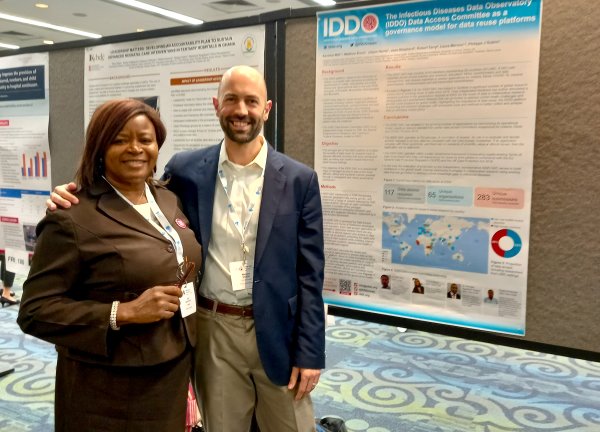
It was a busy few days as around 1,500 participants represented 65 countries at the event, which was highly multi-disciplinary, addressing topics ranging from implementation research and policy influence to funding strategy and operational capacity in resource-limited settings, all aligned with CUGH’s aim to support the university as a transforming force in global health.
Matt was joined by IDDO Data Access Committee (DAC) member, Dr Joan H. Shepherd, from the Sierra Leone Ethics and Scientific Review Committee (Ministry of Health and Sanitation) and Principal of the National School of Midwifery who was at the conference to present her work in a session on equity and innovation in health professional education: Covid-19 Pandemic and Post-Pandemic. Dr Shepherd also co-presented a poster on the IDDO DAC as a governance model for data reuse platforms.
“Participating at the recent CUGH Conference offered a unique opportunity to engage in face-to-face interaction with other professionals in the global health drive,” said Dr Shepherd. “Discussions around the presentations by speakers were lively and engaging, paving the way for future areas of collaboration and interest.
“IDDO’s contributions to the conference strategically highlighted ongoing work in selected infectious diseases as it positions sound structures, reliable processes and project outputs of its various research areas contributing to the overall story.”
Several IDDO partner institutions had a prominent role in the conference, including ICDDR,B (International Centre for Diarrhoeal Disease Research, Bangladesh), Nigeria Centre for Disease Control and TDR, the Special Programme for Research and Training in Tropical Diseases, hosted at WHO, who oversee IDDO’s data governance.
Dr Shepherd continued: “Certainly, global health discussions cannot be without mention of infectious diseases, especially since the Ebola outbreak in Guinea, Sierra Leone and Liberia. The work of IDDO makes room for reflection on the critical role of research and use of data to inform policy and practice in low-resourced countries.
“Participants showed a keen interest in the work of IDDO. The poster presentation and speaker’s platform provided an opportunity to share IDDO’s success stories and influence on clinical research. Matt’s presence provided finer details on the relevance of the data repository and enhanced the knowledge base of participants, drawing attention to the important work of data reuse through the data repository.
“The wealth of unused data is the “missing piece of the puzzle” in global health, and its potential value and scientific contribution is well accounted for throughout IDDO’s narrative on utilising data to inform policy and global health action justifiably through its data repository and equitable access.
“Personally, the conference stimulated a deeper sense of responsibility to contribute to collaborative research as a priority area now and in the future. Encounters at the CUGH conference further energised and inspired one to do more through global networks and collaborative partnerships. It enhances the thirst for continuous professional development and education, particularly during pandemics, and getting to know what others are doing in contributing towards achieving the vision of global health.”
About CUGH
Initially formed in 2009 by a handful of U.S. universities, the 14th Annual Consortium of Universities for Global Health Conference has expanded to include a growing membership of institutions in the Global South, and IDDO presented its work in the context of a session on Decolonization: Reforming Global Health, Equity, Justice, Education and Research.
CUGH represents a powerful global network to help deliver shared solutions to problems for universities in the global health space that would otherwise be tackled in isolation, with representative committees and expert working groups covering advocacy, education, operations, research, ethics and legal matters. IDDO will be maintaining links established at the conference in order both to learn, and to share its experience in equitable approach to data collaborations in global health research.

Yanina joined IDDO in March 2023. As a Data Manager, she is working on transforming and curating datasets, with a focus on Antimicrobial Resistance (AMR).
Prior to joining IDDO, Yanina worked as a Research Assistant in Institut Pasteur, Paris.
Earlier, Yanina gained her MD qualification in Ukraine, followed by a Joint Masters Degree in Public Health from the University of Sheffield and French School of Public Health (EHESP).
Dr James Watson becomes IDDO’s new Associate Director
The Infectious Diseases Data Observatory (IDDO) is delighted to announce that Dr James Watson has been appointed as the new Associate Director from March 2023.

James takes over from Laura Merson, who has been leading new initiatives in data sharing for emerging infections at IDDO since 2015.
James is a statistician whose research focuses on the treatment of infectious diseases. James holds a Wellcome-funded Henry Dale Fellowship on improving the diagnosis and treatment of severe falciparum malaria. James also works on Plasmodium vivax malaria, COVID-19, and Chagas disease. He is currently based at the Oxford University Clinical Research Unit (OUCRU) in Viet Nam and will transition to Oxford during his fellowship.
Professor Philippe Guérin, Director of IDDO said: “We are thrilled to welcome James’ expertise to the team, and look forward to the impact that his breadth of experience will bring to IDDO’s efforts to maximise the value of data reuse and open science.”
Prior to taking up his Fellowship, James was a post-doctoral researcher at the Mahidol Oxford Tropical Medicine Research Unit (MORU), Bangkok. He received his doctorate in Statistics from the University of Oxford, and holds a first-class honours degree in Mathematics and Computer Science, also from Oxford. Alongside his deep expertise on a range of diseases within IDDO’s portfolio, James has published on machine learning, pharmacometric modelling, and trial design.
James’ recent research looked at the efficacy of tafenoquine for the radical cure of vivax malaria. Tafenoquine’s main advantage is that it can be taken as a single dose, unlike primaquine, the current treatment, which needs to be taken daily for 7–14 days. His work, using WWARN-hosted data, found strong evidence that the currently recommended adult dose of tafenoquine is insufficient for radical cure in all adults.
“The same single dose of tafenoquine is recommended for all adults and this has important practical advantages. However, because of variation in body weight, that dose results in substantial variation in drug exposure,” explained the paper’s lead author Dr James Watson. “Overall, it seems that the currently recommended adult dose of tafenoquine is not as good as optimal primaquine treatment in preventing relapsing P. vivax malaria in all endemic regions.”
To understand more about tafenoquine’s mechanism of action and optimal dosing, the team conducted an individual patient data meta-analysis from patients recruited to the three clinical trials that led to the drug’s approval, and healthy volunteers involved in an earlier pharmacokinetics study. They used statistical models to characterise the relationship between the weight-adjusted dose of tafenoquine or primaquine treatment and the likelihood of recurrent malaria infection.
Find out more about James’ work in vivax malaria in our recent webinar.
World Economic Forum blog on IDDO
We work with researchers in disease-affected communities to address their key priorities and improve patient outcomes. IDDO shares knowledge, delivers collaborative analyses, and ensures academic recognition for all data contributors. The World Economic Forum recently blogged on our work. "There are key initiatives globally which leverage the power of data to help fight infectious diseases, and IDDO is at the forefront … Crucially, what is needed is more information to understand the distribution of infectious diseases and to optimise the use of current medicines.”

First published on the World Economic Forum Agenda - Shaping the Future of Health and Healthcare blog on 15 March 2023
Poverty and infectious disease come together far too often — the solution could be data-driven
- Every year, malaria, HIV and tuberculosis kill over 2.8 million people — and this burden is felt disproportionally by less wealthy countries.
- Data is a powerful tool to research answers to the infectious diseases problem, but can be piecemeal or patchy.
- To address this challenge, the Infectious Diseases Data Observatory collates data on infectious diseases, making it interoperable and available to researchers worldwide.
Infectious diseases are a problem everywhere — but more so in the world’s poorer countries.
Every year, malaria, HIV and tuberculosis (TB) kill over 2.8 million people, and more than 1.7 billion people require treatment for at least one neglected tropical disease (NTD). In addition, epidemic-prone infectious diseases such as COVID-19 and Ebola can claim thousands to millions of lives before control and preventive measures can be effective.
Low-income and middle-income countries (LMICs) bear a disproportionately high burden of these infectious diseases, when compared with wealthier countries. This is due to a combination of factors, including poor sanitation, limited access to healthcare, inadequate vaccination coverage, presence of specific vectors, poverty and malnutrition.
Infectious disease: a global-scale challenge
While progress has been made, the COVID-19 pandemic saw health services everywhere stretched to capacity, affecting the delivery of infectious diseases control programmes. Infectious diseases can have dire consequences for at-risk populations in LMICs, where health inequity is compounded by poverty and limited access to healthcare resources.
The World Health Organization (WHO) has identified 20 different conditions as Neglected Tropical Diseases. But despite causing devastating health, social and economic consequences to more than one in eight of us worldwide, to date, there has been little commercial incentive to develop new treatments for NTDs.
Treatment options are often limited in terms of the number of therapeutics and are not adapted to target populations, like young children who often need different formulations. Many treatments were developed decades ago and can also become less effective over time due to the emergence of antimicrobial resistance. The WHO has declared antimicrobial resistance one of the top 10 global public health threats facing humanity.
In resource-limited settings, the prevalence of resistance in most diseases is poorly documented, and there is inadequate capacity to measure the prevalence of antimicrobial resistance affecting LMICs or to detect emerging infections.
Crucially, what is needed is more information to understand the distribution of infectious diseases and to optimise the use of current medicines. However, in the field of poverty-related diseases, scientific data are often scarce, come in many different formats, are not always stored digitally and are scattered across institutions around the world.
Repositories of viral genomic sequences and associated data are proliferating globally. Efficient access to these data repositories, while respecting relevant policies, laws and governance protocols, is challenging. Moving this data to a central repository — often the default data storage option — can be cumbersome and politically difficult. Different models of access via networked data repositories are required. This would mean data can be queried by trusted users and a global set of insights developed and rapidly applied toward public health responses and innovation in vaccines, diagnostics and therapeutics.
The World Economic Forum’s Pathogenic Genomic Surveillance initiative aims to evaluate the feasibility of federating distributed repositories of viral sequence data and other associated data from viral sequencing efforts in low-income and middle-income countries. It also envisions trial frameworks for public-private collaboration on data access to accelerate the development of diagnostics, vaccines and therapeutics.
There are key initiatives globally which leverage the power of data to help fight infectious diseases, and the Infectious Diseases Data Observatory (IDDO) is at the forefront.
Sharing data to tackle infectious diseases
The WorldWide Antimalarial Resistance Network (WWARN) creates a global database to track and understand resistance in malaria. IDDO evolved from WWARN, incorporating its pioneering work. IDDO focuses on a wide range of infectious diseases. Currently, it works across 16 research areas, including: COVID-19, malaria, visceral leishmaniasis, medicine quality, antimicrobial resistance, Chagas disease, Ebola, schistosomiasis, soil-transmitted helminthiases, lymphatic filariasis and HIV, with more already in development or being scoped for feasibility.
IDDO works with researchers in disease-affected communities to identify and collate anonymised individual patient data (IPD) that can be stored irrespective of the formats it is collected in. Informed by a global committee of subject matter experts, IDDO then standardises IPD from multiple clinical trials or epidemiological studies so that it can then be analysed as a single dataset, increasing the statistical power needed to answer key research questions. By using globally-recognised standards, IDDO ensures the optimal use of data contributed from multiple sources — now and for years to come.
Using IPD is key because it gives researchers a level of granularity about what happened to particular patients and allows for the study of subgroups such as malnourished children, pregnant women and patients with co-morbidities, who are too often underrepresented in individual studies.
Curation enables interoperability
IDDO is building a partnership with the Indian Council of Medical Research (ICMR) both in and beyond data and skill-sharing to exchange and share ideas on emerging infections and three vector-borne diseases in the elimination phase: malaria, visceral leishmaniasis and lymphatic filariasis.
Among many others, it collaborates with the National Institute of Malaria Research (NIMR) in New Delhi, the Vector Control Research Centre (VCRC) in Puducherry, the Rajendra Memorial Research Institute of Medical Sciences (RMRIMS) in Patna, the University Cheikh Anta Diop in Dakar, the University of Cape Town, Menzies School of Health Research, Wellcome Trust, Mahidol Oxford Research Unit (MORU) in Thailand and the Oxford University Clinical Research Unit in Vietnam.
IDDO has over 2,000 global research contributors, and its repository now hosts data from more than one million patient infections. The data is available for reuse by the research community. WWARN’s meta-analysis has informed the updated WHO guidelines for treatment of uncomplicated malaria in the first trimester of pregnancy.
Working together, achieving more
The United Nations Sustainable Development Goals (SDGs) call for an end to epidemics of the deadliest Infectious diseases by 2030 — this means work must be done in LMICs.
The need of the hour is to assemble data for use by the public health research and humanitarian communities, generating the scientific evidence that accelerates advances in safe and improved treatments for patients.

Justine joined IDDO in February 2023. As a Data Manager she works on the management and transformation of diverse data sets that are submitted to IDDO and ensures the completeness and accuracy of the data in the IDDO data repository.
Previously, Justine worked as a Data Manager and Data Entry Clerk in the Cambridge Clinical Trials Unit as part of the SIMPLIFIED Trial from 2020 to 2023. As a Data Manager, she provided oversight data collection and data linkage in the trial.
Justine has a BSc in Biological Sciences from University of Hertfordshire and MSc in Clinical Drug Development from Queen Mary, University of London.

